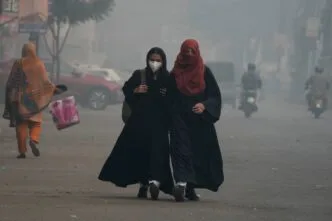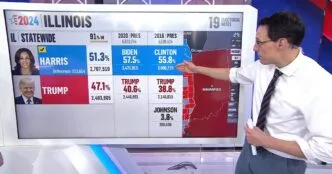Vice President Kamala Harris chose not to address supporters in Washington, D.C., early Wednesday morning after former President Donald Trump won rgia and North Carolina, the first two battlegrounds to fall in the 2024 race for the White House.
Cedric Richmond, a co-chair of Harris’ campaign, told the crowd at Howard University that the vice president would not speak publicly until later Wednesday.
“We still have votes to count. We still have states that have not been called,” Richmond said shortly before 1 a.m. ET. “You will hear from her tomorrow.”
The decision to stay quiet accompanied a drastic shift in mood for her campaign aides, her supporters and Democratic officials as vote totals in battleground states suggested an increasingly narrow path to victory. At the start of the night, Harris aides said they believed she would win. By the end of Tuesday, they were arguing that she still had a shot.
Panicked Democrats described experiencing flashbacks to Trump’s victory over former Secret of State Hill Clinton in 2016.
“It’s pretty concerning,” a Democratic lawmaker said. “I just keep reminding myself that eight years ago all the trends in the first few hours showed Hill winning, and then she didn’t. But obviously this is not the return we were looking for.”
One veteran Democratic strategist said of the pall over the party right now: “Have you ever been to a funeral? That would be a Mardi Gras compared to this.”
A Democrat at a gathering of major Harris donors at a hotel in Washington, D.C., also likened the atmosphere to that of a funeral.
Harris’ campaign manager, Jennifer O’Malley Dillon, insisted in an internal memo obtained by NBC News — put out before the North Carolina and rgia projections — that Harris still had a way to win.
“While we continue to see data trickle in from the Sun Belt states, we have known all along that our clearest path to 270 electoral votes lies through the Blue Wall states,” O’Malley Dillon wrote in reference to Pennsylvania, Michigan and Wisconsin.
“Those of you who were around in 2020 know this well: It takes time for all the votes to be counted — and all the votes will be counted,” she wrote. “That’s how our system works. What we do know is this race is not going to come into focus until the early morning hours.”
But hours later, a Democratic congressman from one of those Blue Wall states said it was very unlikely that the tallies would turn out well for Harris in any of those contests.
“I don’t see a realistic path in Pennsylvania, Wisconsin or Michigan,” the lawmaker said.
At Harris headquarters on the campus of Howard University in Washington, thousands stared at screens in near-silence, appearing stone-faced. No one waved the American flags that were handed out earlier in the evening. The vibe went from joyful and celebratory to worried and anxious.
A few dozen people in the crowd, clearly done with watching the returns, started chanting: “Music! Music!” Soon after, a giant screen playing cable news was muted and the deejay began playing rap music. Some Harris staffers paced around with blank looks on their faces.
At the same time, some Democratic campaign veterans acknowledged the steep hill Harris would have to climb to win.
“Praying for a miracle,” one former Biden campaign aide said. “It’s all on the Blue Wall.”
Republicans already put themselves in position to take control of the Senate — barring an unforeseen upset — with victories in Democratic-held seats in West Virginia and Ohio. And an NBC News exit poll Tuesday showed that the proportion of voters who identify as Democrats was down to 32% — the lowest point this century.
Meanwhile, a senior Trump adviser suggested that Trump might deliver remarks about the race in West Palm Beach, Florida.
A second aide told NBC News that they were hoping for more Sun Belt wins and that Trump’s current narrow lead in Pennsylvania would provide good context for closing the night.
Roger Stone, a longtime friend and informal adviser, said Trump seemed “in a great mood and very upbeat” as Stone arrived at the West Palm Beach Convention Center, where Trump will be expected to speak, after he attended Trump’s watch party at Mar-a-Lago.
The mood among Democratic operatives was very different, according to a longtime party fundraiser.
“They’re f—ing freaking out,” the fundraiser said. “How is it possible that we could lose to this guy? It’s just malpractice.” However, he added, he still held hope that Harris could pull out a victory.
At the presidential level, no state had yet flipped from one party to the other as of midnight, with Trump winning states like Kentucky and Indiana and Harris winning Vermont and Massachusetts, according to NBC News projections. Trump also won Florida, which has shifted steadily to the right in recent election cycles.
Harris won Virginia, according to an NBC News projection, despite some late Republican hopes that it could be within reach.
In addition to the White House, control of the House hung in the balance Tuesday night. But the narrow margins in the chamber, a series of West Coast races and the potential for slow vote-counting suggested a call on which party would win the majority could take some time.
In an ominous development for Democrats, the share of voters identifying with their party hit the lowest mark this century. According to the NBC News Exit Poll, 32% of voters identified as a Democrat, down from 37% four years ago. The exit poll also found the highest level of voters identifying as independent or “Something else” this century (34%). The share of voters identifying as a Republican has moved less, standing at 34% this year.
The two presidential candidates’ supporters split over the main issues facing the country on Election Day, differences that, in part, reflected where they put their focus. NBC News exit polling also showed significant demographic shifts in the two parties’ coalitions.
Among the most pronounced changes: Latino men favored Trump by a 10-point margin, 54%-44%, after they backed the 2020 Democratic nominee, Joe Biden, by a 23-point spread four years ago, 59%-36%.
In a smaller shift — but a sizable one in its own right — Harris held a 25-point edge among Latino women, down 14 percentage points from Biden’s 39-point spread over Trump in 2020.
At the same time, Trump experienced attrition among suburban white women, carrying 51% of them this year, compared with 56% four years ago, according to the exit polls. Harris also got a boost from older voters, taking the 65-plus set 50% to 49%. That reversed Trump’s 5-point 2020 win among senior citizens. Moreover, older voters made up 28% of the electorate, more than the 22% they constituted in 2020.
Most Harris voters rated democracy as their top issue, while most Trump voters said the economy mattered most to them. In all, 35% of voters placed democracy at the top of their lists, while 31% said the economy and 14% said abortion.
Fifty-six percent of Harris voters put democracy first, while 21% named abortion as their highest priority and 13%picked the economy. Fifty-one percent of Trump voters saw the economy as the biggest issue, 20% named immigration and 12% said democracy.
Harris promised that she would restore abortion rights that were left vulnerable to restrictions by the Supreme Court’s Dobbs decision. Trump said that abortion decisions belong in the hands of states, where they now reside, but that he favors bans that exempt cases of rape, incest and danger to the life of the woman.
In a sign of how the politics of abortion have shifted now that states are able to impose more limits, more Trump voters think abortion should be legal now than they did in 2020, according to the early exit polls. Back then, 26% of Trump voters said abortion should be illegal. On Tuesday, that number was 38%.
Overall, 51% of voters said in 2020 that abortion should be legal in all or most cases. But now, 66% say that. At the same time, the percentage of voters who believe abortion should be illegal in all cases dropped from 17% in 2020 to 6% this year.
With North Carolina going to Trump, Harris’ most plausible path to winning 270 electoral votes — and becoming the first woman elected president — still ran through the “blue wall” states of Pennsylvania, Michigan and Wisconsin, along with Nebraska’s 2nd Congressional District. Trump, who would become the first defeated president to reclaim the White House since Grover Cleveland in 1892, would hit the magic number by adding rgia and Pennsylvania — or rgia, Arizona and either Michigan or Wisconsin — to his column.
Both candidates and their campaigns expressed confidence in the closing days that they were on track to win.
“The momentum is on our side,” Harris said at her final rally, in Philadelphia, Monday night.
“I think we’re going to have a very big victory today,” Trump said as he cast his ballot in West Palm Beach, Florida, on Tuesday afternoon.
Despite their sense of success, 72% of voters said in NBC News exit polls that they are either angry or dissatisfied with the state of the country, with only 26% reporting that they are satisfied with or enthusiastic about it.
There were signs of demographic shifts in the electorate in the early exit polls. Trump’s popularity waned among white voters, while it ticked up among Black and Latino voters. In 2020, 57% of white voters viewed Trump favorably, as did 38%of Latino voters and 10% of Black voters. This year, only 49% of white voters said they saw Trump favorably, while his numbers among Latino and Black voters rose to 42% and 14%, respectively.
There had been no reports of major, widespread issues related to voting as of Thursday evening, though many states had hours left before polls closed.
The most notable issue was in rgia, where bomb threats directed at polling sites caused some tempor evacuations but did not appear to dramatically affect the vote. A dozen precincts will stay open a bit later to account for the interruption, rgia Secret of State Brad Raffensperger said.
There have been no signs of major cyberattacks, a concern after the 2016 presidential election. And snafus with scanning or counting ballots have been mostly minor and expected.
A software malfunction prevented voters in Cambria County, Pennsylvania, from scanning their ballots early in the morning, but voting there was extended until 10 p.m. In addition, more than 30,000 absentee and early ballots in Milwaukee are being recounted after officials noticed that vote tabulator machines were not properly closed.











